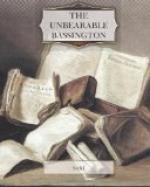The form-master laughed. “You evidently think that the ’Boy who would not grow up’ must have been written by a ’grown-up who could never have been a boy.’ Perhaps that is the meaning of the ’Never-never Land.’ I daresay you’re right in your criticism, but I don’t agree with you about Bassington. He’s a handful to deal with, as anyone knows who has come in contact with him, but if one’s hands weren’t full with a thousand and one other things I hold to my opinion that he could be tamed.”
And he went his way, having maintained a form-master’s inalienable privilege of being in the right.
* * * * *
In the prefects’ room, Comus busied himself with the exact position of a chair planted out in the middle of the floor.
“I think everything’s ready,” he said.
Rutley glanced at the clock with the air of a Roman elegant in the Circus, languidly awaiting the introduction of an expected Christian to an expectant tiger.
“The kid is due in two minutes,” he said.
“He’d jolly well better not be late,” said Comus.
Comus had gone through the mill of many scorching castigations in his earlier school days, and was able to appreciate to the last ounce the panic that must be now possessing his foredoomed victim, probably at this moment hovering miserably outside the door. After all, that was part of the fun of the thing, and most things have their amusing side if one knows where to look for it.
There was a knock at the door, and Lancelot entered in response to a hearty friendly summons to “come in.”
“I’ve come to be caned,” he said breathlessly; adding by way of identification, “my name’s Chetrof.”
“That’s quite bad enough in itself,” said Comus, “but there is probably worse to follow. You are evidently keeping something back from us.”
“I missed a footer practice,” said Lancelot
“Six,” said Comus briefly, picking up his cane.
“I didn’t see the notice on the board,” hazarded Lancelot as a forlorn hope.
“We are always pleased to listen to excuses, and our charge is two extra cuts. That will be eight. Get over.”
And Comus indicated the chair that stood in sinister isolation in the middle of the room. Never had an article of furniture seemed more hateful in Lancelot’s eyes. Comus could well remember the time when a chair stuck in the middle of a room had seemed to him the most horrible of manufactured things.
“Lend me a piece of chalk,” he said to his brother prefect.
Lancelot ruefully recognised the truth of the chalk-line story.
Comus drew the desired line with an anxious exactitude which he would have scorned to apply to a diagram of Euclid or a map of the Russo-Persian frontier.
“Bend a little more forward,” he said to the victim, “and much tighter. Don’t trouble to look pleasant, because I can’t see your face anyway. It may sound unorthodox to say so, but this is going to hurt you much more than it will hurt me.”




